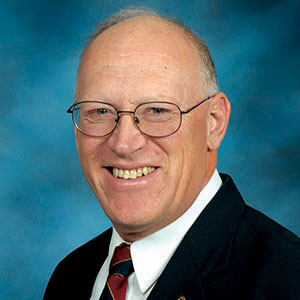Kansas Profile – Now That’s Rural: Don Rowlison, Cottonwood Ranch
At a glance: Don Rowlison, the first State Public Archeologist for the Kansas State Historical Society, became curator for the Cottonwood Ranch state historic site, which commemorates the ranch founded by a British sailor who migrated to northwest Kansas more than a century ago. The Brit’s home is one of the oldest intact buildings in northwest Kansas.
More information: Ron Wilson, rwilson@ksu.edu, 785-532-7690
Photos: Ron Wilson | Don Rowlison
Website: Huck Boyd National Institute for Rural Development
March 27, 2024

By Ron Wilson, director of the Huck Boyd National Institute for Rural Development at Kansas State University
What was a British sailor doing in the middle of the Great Plains more than 100 years ago?
![]() The answer is, he was enjoying a sea of grass, on his historic ranch in northwest Kansas. Today this historic ranch still shares this history from more than a century ago.
The answer is, he was enjoying a sea of grass, on his historic ranch in northwest Kansas. Today this historic ranch still shares this history from more than a century ago.
Don Rowlison is archeologist and curator of the Cottonwood Ranch Historic Site in northwest Kansas. He grew up about 15 miles from this ranch site, went to school in Hoxie and then Colby Community College. He ultimately earned a bachelor’s degree from Kansas State University in anthropology with an emphasis on archeology, and a master’s degree in education. He also managed a ranch in the Flint Hills
At right: Don Rowlison | Download this photo
Rowlison went to work for the Kansas State Historical Society. In 1980, he became the agency’s first State Public Archeologist for Kansas.
In that capacity, he presented many programs on historic preservation and cultural resources. He also led the society’s two-week amateur archeological dig.
In 1985, he returned to northwest Kansas as curator of a new state historic site known as the Cottonwood Ranch. That site is owned by the state and is now maintained by the Friends of the Cottonwood Ranch association.
Cottonwood Ranch was founded by a former British Navy sailor named Abraham Pratt. In 1878, Pratt bought 160 acres in Sheridan County. “It was in a sea of grass,” Rowlison said. Pratt later convinced his two sons to leave England and join him. They first lived in a dugout along the Solomon River.
The Pratts planted many cottonwood trees and named the place Cottonwood Ranch. The first building on the place, the house, had native stone walls, a sod-covered roof, and an earthen floor. Eventually the sod roof was replaced with wood and two additions were added on to the building.
Today, this is one of the oldest intact buildings in northwest Kansas. =Other stone buildings, still standing, are arranged in what was called the “Yorkshire pattern” of Pratt’s boyhood homeland. =Those buildings include a stable, bathhouse, shearing shed, bunkhouse and more.
Abraham Pratt’s son, Fenton, became a highly successful sheep rancher. At one point, they had as many as 3,500 Merino sheep. They shipped wool to markets as far east as Philadelphia.
Fenton helped finance many local settlers. He was also an amateur photographer. “We have almost 200 glass negatives (that once belonged to Fenton Pratt),” Rowlison said.
Abraham Pratt also founded the nearby town of Studley. How did Studley get its name? “The Pratts must have had the foresight to name it for me,” Rowlison said with a smile. He then conceded that Studley was named for Studley Royal, a historic park near the Pratt’s hometown in England.
Studley was never incorporated and had perhaps 100 people at its peak population. Today it is a rural community of 22 people. Now, that’s rural.
The last member of the Pratt family passed in 1980. Two years later, the property was acquired by the Kansas State Historical Society to be used as an outdoor museum to interpret ranching and farming in northwestern Kansas. The historic site is listed on the National Register of Historic Places.
Don Rowlison is retired but serves as curator of the ranch and provides tours. The well-preserved buildings still stand and can be visited at any time. Cottonwood Ranch is located along Highway 24 near the Sheridan-Graham county border. “We’ve had visitors from all over the world,” Rowlison said.
In 2021, a Cottonwood Ranch film documentary was produced featuring Don Rowlison. It was aired on PBS stations in Kansas and was so well received that it spawned a video series called Cottonwood Connections. “We’re on our third season,” Rowlison said. Past episodes can be viewed on YouTube.
For more information, see www.cottonwoodranchks.com.
This is the true story of a historic ranch created by a British sailor who made his home far from the ocean in rural Kansas. We commend Don Rowlison and the Friends of Cottonwood Ranch for making a difference by preserving and promoting this history.
It makes me think of Robert Louis Stevenson’s words in the poem Requiem: “Home is the sailor, home from sea, And the hunter home from the hill.”
Audio and text files of Kansas Profiles are available at http://www.kansasprofile.com. For more information about the Huck Boyd Institute, interested persons can visit http://www.huckboydinstitute.org.
***

K‑State Research and Extension is a short name for the Kansas State University Agricultural Experiment Station and Cooperative Extension Service, a program designed to generate and distribute useful knowledge for the well‑being of Kansans. Supported by county, state, federal and private funds, the program has county extension offices, experiment fields, area extension offices and regional research centers statewide. Its headquarters is on the K‑State campus in Manhattan. For more information, visit www.ksre.ksu.edu. K-State Research and Extension is an equal opportunity provider and employer.